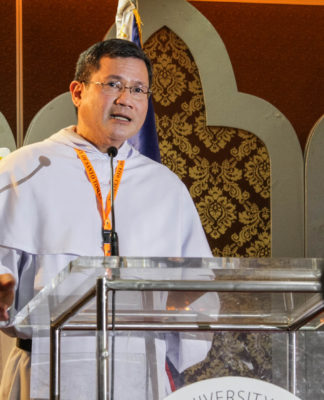MEN, MODERNITY and misconception often create a history hostile to reality.
This was the collective observation of three political analysts who examined the timeline of Philippine politics from the post-revolutionary era to the contemporary times during a discussion organized by the Political Science Forum and the National Historical Institute last February 6 at the Thomas Aquinas Research Complex.
“History is an entertaining tale of real people,” former trade secretary Amado Lagmadeo said in the forum titled Ang Pulitika ng Papel at Pluma: Panorama ng Kamalayang Pulitikal ng Pilipino, before a jam-packed audience of students from the Faculty of Arts and Letters.
Discussing the country’s political history from the 1890s to the 1960s, Lagdameo spoke of a “cycle” that each emerging generation follows in order to surpass the achievements of the previous generation, at least in terms of innovation.
Defending his view, Lagdameo recalled how ideologies such as Marxism had long faded in the face of rapid political developments around the world.
“If the Marxists’ beliefs were correct, they could have been in power long before,” said Lagdameo, who also recounted the struggles of Jose Ma. Sison in establishing the Communist Party of the Philippines following the demise of its precursor, the Partido Komunista ng Pilipinas under Crisanto Evangelista in 1948.
“He had a hard time handling the communist party because they lacked unity and many opposed Sison’s leadership,” Lagmadeo said. “The study of political science never starts with theories, but with history.”
Recalling his experience as information minister under the Marcos dictatorship, former senator Francisco Tatad talked about Martial Law as he tackled Philippine politics during the turbulent 1970s.
“I thought, at that time, I was doing a good job — writing press releases for Marcos and serving as his spokesperson. But I felt that the dictatorship was going on for so long, until I could no longer bear it and left,” Tatad said.
Marcos’s desire to stay in power drove him to declare military rule, Tatad said.
“Martial Law, according to a law dictionary, says that it must be exercised when civilian authority could no longer control war or societal troubles,” Tatad said. “But Marcos’ fascination for power led him to declare the whole nation under Martial Law, without sufficient basis.”
Meanwhile, historian Manuel Quezon III discussed the “threats” posed by modernity to Philippine political thought in his lecture on the post-revolutionary era.
Quezon said modernity threatens religion, because it usually deviates from the “norms enforced by the Church.” Also, Filipinos generally adhere to the concept of an “imagined community.”
“When we hear the word modernism, we often fail to think about the natives,” he said. “Ask them about their nationality and they will answer ‘Ilonggo’ or ‘Waray’ instead of ‘Filipino.’”
It was during the post-revolution era when the American colonizers exerted a lasting influence on Filipino culture – in food, arts, and even politics, Quezon noted.
“Many Filipinos were frightened of the idea of independence from the Commonwealth government. They grew accustomed to the influences of the Americans and thought that the country will go astray if they (the Americans) leave,” Quezon said.
Present danger
Artlets Prof. Edmund Tayao, along with reactors Eduardo Santoalla and Ramon Casiple, left a hanging question after the talk.
“Are we not yet under Martial Law?” asked Tayao, pertaining to Tatad’s comprehensive explanation on Martial Law.
He pointed out, though, that the Filipino culture tends to favor a “strongman rule.”
“But apathy enters the scene when Filipinos start to accept everything going on around without even questioning why,” Tayao said. “I wonder if the “pangulo regime” is synonymous to “pang-gulo regime.”
Casiple shared the same sentiment.
“If you have apathetic people, one might think the leadership is strong and effective, but it does not follow,” Casiple said. “It takes two to have politics.”
The three reactors also focused on the recent ouster of Jose de Venecia as House speaker.
“If the president’s son can easily take the fourth highest official out of his position, I believe we must all be frightened,” Casiple said.
Santoalla reminded the students to “resist totalitarian temptation and put a middle ground between the leader and his people.”
















